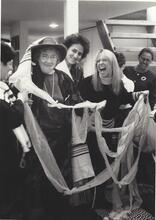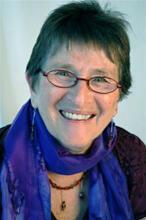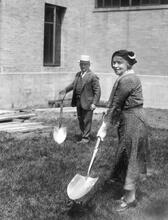Judith Hauptman
Judith Hauptman was the first woman to receive a PhD in Talmud and is now the E. Billy Ivry Professor Emerita of Talmud and Rabbinic Culture at the Jewish Theological Seminary of America. Hauptman has made significant contributions to the study of the origins and development of the works of the “canon” of rabbinic literature of Late Antiquity. A second prominent focus of both Hauptman’s scholarly and other work has been Jewish feminism and the status of women in rabbinic and related literature, as exemplified in her work, Rereading the Rabbis: A Woman’s Voice. In 2003, she earned rabbinic ordination at the Academy for Jewish Religion, and she currently serves as a member of the Committee on Jewish Law and Standards of the Rabbinical Assembly.
Education and Career
Judith Hauptman is the first woman to receive a PhD in Lit. "teaching," "study," or "learning." A compilation of the commentary and discussions of the amora'im on the Mishnah. When not specified, "Talmud" refers to the Babylonian Talmud.Talmud. She then joined the faculty at the Jewish Theological Seminary of America, where she has held the Rabbi Philip R. Alstat Professorship in Talmud and currently holds the title of E. Billy Ivry Professor Emerita of Talmud and Rabbinic Culture.
Hauptman was born and raised in Brooklyn, New York. After graduating from the Yeshivah of Flatbush, she enrolled in Barnard College. After a year there, she moved to Jerusalem and spent three years studying at the Hebrew University; she then returned to Barnard College and received her bachelor’s degree in economics in 1967. At the same time, she also earned a bachelor’s of Hebrew Literature in Talmud from the Seminary College of Jewish Studies (now the Albert A. List College) of the Jewish Theological Seminary. She continued her education at JTS, studying for a master’s degree in Talmud (awarded in 1973) and completing her doctorate in 1982 under the supervision of David Weiss Halivni.
In addition to her faculty role at JTS, Hauptman has also served as the assistant dean of the Seminary College of Jewish Studies. Over the course of her career, Hauptman has been an active educator and lecturer. She has taught on the faculties of the City College of New York, the Hebrew Union College in New York, the Seminario Rabinico Latinoamericano (JTS’ sister school in Buenos Aires), and JTS’s Project Judaica at at the Russian State University for the Humanities in Moscow. She has also taught for the adult education program at the 92nd Street Y in Manhattan, the Brandeis-Bardin Institute in California, the Wexner Heritage Foundation, and Limmud NY and UK. Hauptman has been a member of the board and taken on other related roles for the Association for Jewish Studies (AJS); moreover, she has been an active participant in AJS’s Women’s Caucus, including turns as the Caucus co-chair, treasurer, and moderator of the group’s on-line discussion forum. She has also served on the Commission on Equality for Women of the American Jewish Congress.
Scholarship in Rabbinic Literature
Hauptman has made significant contributions to the academic study of the origins and development of the works that make up the “canon” of rabbinic literature of Late Antiquity. Much of her scholarship entails the synoptic study of rabbinic texts: the study of parallel and related texts found in different documents as a means of exploring the historical development of laws, traditions, and documents in rabbinic culture and writing. Her first book, Development of the Talmudic Sugya: Relationship Between Tannaitic and Amoraic Sources (published in 1988), addresses the place of early, “tannaitic” literature in the rabbinic culture of study that ultimately produced the two talmudim (Jerusalem and Babylonian).
Feminist Talmud scholar Judith Hauptman speaking on “Exercise Trackers and Mitzvah Motivators,” 2015.
Much of Hauptman’s more recent work has probed the relationship of the two early rabbinic legal documents, the Mishnah (which serves as the basis for the Jerusalem and Babylonian Talmuds) and the Tosefta. Because it is widely accepted that the Mishnah is the earlier of these two to be redacted, and because the name “Tosefta” is derived from the Hebrew term meaning “addition,” scholars have traditionally viewed the Tosefta as a supplement and/or commentary to the Mishnah. Hauptman has become a pioneer in a growing new approach, one that sees in the Tosefta materials that pre-date the Mishnah and out of which Mishnaic material were developed. Her work in this area culminated in her 2005 book, Rereading the Mishnah: A New Approach to Ancient Jewish Texts.
Hauptman’s most recent, on-going research (as of this writing in 2020) addresses legal anecdotes in the Jerusalem and Babylonian Talmuds. These small stories often entail subtle changes and deviations from the The legal corpus of Jewish laws and observances as prescribed in the Torah and interpreted by rabbinic authorities, beginning with those of the Mishnah and Talmud.halakhah as presented in the legal discussion to which the stories are attached, and they frequently feature female members of rabbinic households. Hauptman therefore argues that these anecdotes illustrate that women could be knowledgeable about halakhic practice even if they did not participate in formal rabbinic study, and moreover that they played an important role in adopting practice to the needs of real-life circumstances. In 2013, Hauptman presented on this topic as the invited speaker for the plenary opening lecture of the World Congress of Jewish Studies in Jerusalem.
Scholarship and Activism in Jewish Feminism
A second prominent focus of both Hauptman’s scholarly and other work has been Jewish feminism. In the early 1970s she was a member of Ezrat Nashim, a group advocating for the greater inclusion of women in Jewish ritual in the Conservative Movement, including the ordination of women as rabbis. In 1972, she published “An Assessment of Women’s Liberation in the Talmud” in the journal Conservative Judaism, and two years later her essay “Images of Women in the Talmud” appeared in the collection Religion and Sexism, edited by Rosemary Ruether; she has since published numerous works analyzing rabbinic attitudes and legislation regarding women.
This aspect of Hauptman’s work is exemplified by her book Rereading the Rabbis: A Woman’s Voice, published in 1998. In this work, Hauptman examines the historic development of rabbinic legislation in a number of areas relating to women and women’s lives (marriage and divorce, social relations between the sexes, dowry and inheritance, and so on) in order to demonstrate a consistent trend over time towards greater (though still unequal) rights and protections for women. Her 1993 articles, “Some Thoughts on the Nature of Halakhic Adjudication: Women and Minyan” and “Women and Prayer: An Attempt to Dispel Some Fallacies,” both published in the journal Judaism, became the basis on which JTS Chancellor Ismar Schorsch revised JTS policy to allow full participation for all women in egalitarian services at the Seminary. In 2015, in honor of her seventieth birthday, this aspect of Hauptman’s work, and her essential contribution to the development of feminist scholarship in rabbinics, was feted in a festschrift volume of the journal Nashim, dedicated to “Feminist Interpretations of the Talmud.”
Rabbinic Ordination
After many years of training rabbinical students, Hauptman herself entered the rabbinic program at the Academy for Jewish Religion and was ordained in 2003. She is a member of the Rabbinical Assembly, the international association of rabbis affiliated with the Conservative/Masorti Movement, and serves on the RA’s Committee on Jewish Law and Standards, which sets positions on halakhah (Jewish Law) and practice for the movement. Shortly after her ordination, Hauptman founded Ohel Ayalah (named in memory of her mother), an organization providing free, walk-in High Holiday services and Passover seders in New York City for otherwise unaffiliated, and typical young adult, Jews. For a number of years she took on the role of volunteer chaplain for Jewish residents at the Cabrini Center for Nursing and Rehabilitation in Lower Manhattan.
(Note: some material in this entry is adapted from the author’s entry on Hauptman in the Encyclopedia Judaica, Second edition, Volume 8, p. 461.)
Selected works by Judith Hauptman
"The Talmud's Women in Law and Narrative." Nashim 28 (2015).
“A New View of Women and Torah Study in the Talmudic Period.” Jewish Studies: An Internet Journal 9 (2010).
Rereading the Mishnah: A New Approach to Ancient Jewish Texts. Tübingen, Germany: Mohr Siebeck, 2005.
Rereading the Rabbis: A Woman's Voice. Boulder, CO: Westview, 1998.
"Women and Prayer: An Attempt to Dispel Some Fallacies." Judaism 42:1 (1993).
“Women and the Conservative synagogue.” In Daughters of the King; Women and the Synagogue. Ed. by Susan Grossman, Rivka Haut. Philadelphia: Jewish Publication Society, 1992.
“Judaism and the feminist critique.” Congress Monthly 52:2 (1985).
“Women in the Talmud.” Response; a Contemporary Jewish Review 18 (1973).











